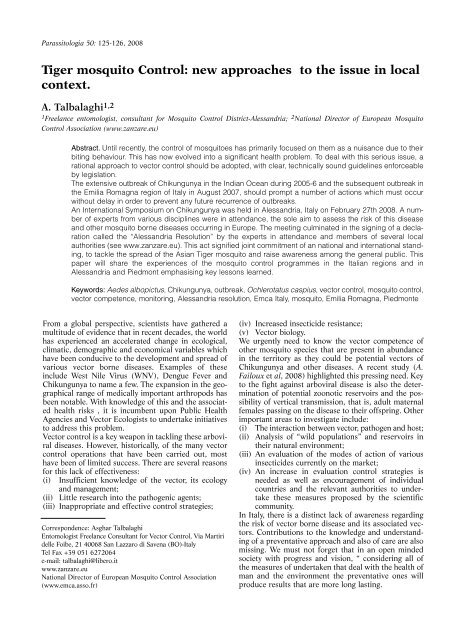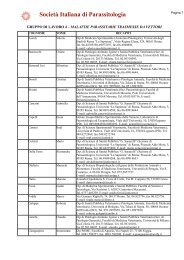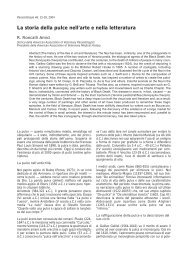impaginato piccolo - Società Italiana di Parassitologia (SoIPa)
impaginato piccolo - Società Italiana di Parassitologia (SoIPa)
impaginato piccolo - Società Italiana di Parassitologia (SoIPa)
You also want an ePaper? Increase the reach of your titles
YUMPU automatically turns print PDFs into web optimized ePapers that Google loves.
<strong>Parassitologia</strong> 50: 125-126, 2008<br />
Tiger mosquito Control: new approaches to the issue in local<br />
context.<br />
A. Talbalaghi 1,2<br />
1 Freelance entomologist, consultant for Mosquito Control District-Alessandria; 2 National Director of European Mosquito<br />
Control Association (www.zanzare.eu)<br />
Abstract. Until recently, the control of mosquitoes has primarily focused on them as a nuisance due to their<br />
biting behaviour. This has now evolved into a significant health problem. To deal with this serious issue, a<br />
rational approach to vector control should be adopted, with clear, technically sound guidelines enforceable<br />
by legislation.<br />
The extensive outbreak of Chikungunya in the In<strong>di</strong>an Ocean during 2005-6 and the subsequent outbreak in<br />
the Emilia Romagna region of Italy in August 2007, should prompt a number of actions which must occur<br />
without delay in order to prevent any future recurrence of outbreaks.<br />
An International Symposium on Chikungunya was held in Alessandria, Italy on February 27th 2008. A number<br />
of experts from various <strong>di</strong>sciplines were in attendance, the sole aim to assess the risk of this <strong>di</strong>sease<br />
and other mosquito borne <strong>di</strong>seases occurring in Europe. The meeting culminated in the signing of a declaration<br />
called the “Alessandria Resolution” by the experts in attendance and members of several local<br />
authorities (see www.zanzare.eu). This act signified joint commitment of an national and international stan<strong>di</strong>ng,<br />
to tackle the spread of the Asian Tiger mosquito and raise awareness among the general public. This<br />
paper will share the experiences of the mosquito control programmes in the Italian regions and in<br />
Alessandria and Piedmont emphasising key lessons learned.<br />
Keywords: Aedes albopictus, Chikungunya, outbreak, Ochlerotatus caspius, vector control, mosquito control,<br />
vector competence, monitoring, Alessandria resolution, Emca Italy, mosquito, Emilia Romagna, Piedmonte<br />
From a global perspective, scientists have gathered a<br />
multitude of evidence that in recent decades, the world<br />
has experienced an accelerated change in ecological,<br />
climatic, demographic and economical variables which<br />
have been conducive to the development and spread of<br />
various vector borne <strong>di</strong>seases. Examples of these<br />
include West Nile Virus (WNV), Dengue Fever and<br />
Chikungunya to name a few. The expansion in the geographical<br />
range of me<strong>di</strong>cally important arthropods has<br />
been notable. With knowledge of this and the associated<br />
health risks , it is incumbent upon Public Health<br />
Agencies and Vector Ecologists to undertake initiatives<br />
to address this problem.<br />
Vector control is a key weapon in tackling these arboviral<br />
<strong>di</strong>seases. However, historically, of the many vector<br />
control operations that have been carried out, most<br />
have been of limited success. There are several reasons<br />
for this lack of effectiveness:<br />
(i) Insufficient knowledge of the vector, its ecology<br />
and management;<br />
(ii) Little research into the pathogenic agents;<br />
(iii) Inappropriate and effective control strategies;<br />
Correspondence: Asghar Talbalaghi<br />
Entomologist Freelance Consultant for Vector Control, Via Martiri<br />
delle Foibe, 21 40068 San Lazzaro <strong>di</strong> Savena (BO)-Italy<br />
Tel Fax +39 051 6272064<br />
e-mail: talbalaghi@libero.it<br />
www.zanzare.eu<br />
National Director of European Mosquito Control Association<br />
(www.emca.asso.fr)<br />
(iv) Increased insecticide resistance;<br />
(v) Vector biology.<br />
We urgently need to know the vector competence of<br />
other mosquito species that are present in abundance<br />
in the territory as they could be potential vectors of<br />
Chikungunya and other <strong>di</strong>seases. A recent study (A.<br />
Failoux et al, 2008) highlighted this pressing need. Key<br />
to the fight against arboviral <strong>di</strong>sease is also the determination<br />
of potential zoonotic reservoirs and the possibility<br />
of vertical transmission, that is, adult maternal<br />
females passing on the <strong>di</strong>sease to their offspring. Other<br />
important areas to investigate include:<br />
(i) The interaction between vector, pathogen and host;<br />
(ii) Analysis of “wild populations” and reservoirs in<br />
their natural environment;<br />
(iii) An evaluation of the modes of action of various<br />
insecticides currently on the market;<br />
(iv) An increase in evaluation control strategies is<br />
needed as well as encouragement of in<strong>di</strong>vidual<br />
countries and the relevant authorities to undertake<br />
these measures proposed by the scientific<br />
community.<br />
In Italy, there is a <strong>di</strong>stinct lack of awareness regar<strong>di</strong>ng<br />
the risk of vector borne <strong>di</strong>sease and its associated vectors.<br />
Contributions to the knowledge and understan<strong>di</strong>ng<br />
of a preventative approach and also of care are also<br />
missing. We must not forget that in an open minded<br />
society with progress and vision, “ considering all of<br />
the measures of undertaken that deal with the health of<br />
man and the environment the preventative ones will<br />
produce results that are more long lasting.






